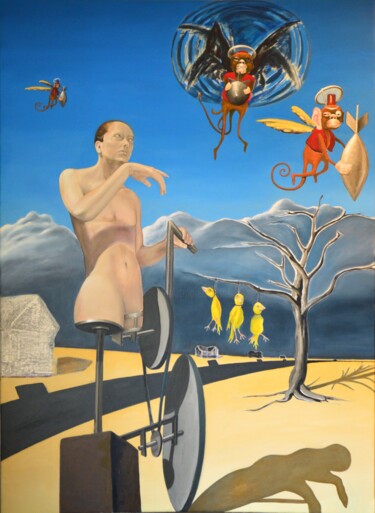
Kristopher Lionel
"I remember that day how the ocean's blue shed a shade or two at the sun's behest and then later how that fickle sea took back a shade or three as the sun tired and fell to rest." -Kristopher Lionel
4 artworks by Kristopher Lionel (Selection)
Download as PDFThe Happy War • 4 artworks
'The Happy War' is about humanity's self-driven, self-reinforced separation from Nature. Each painting [...]
'The Happy War' is about humanity's self-driven, self-reinforced separation from Nature. Each painting is a "page" in a surrealistic allegory. The works in this ongoing series satirize the concept that human beings, above all other living things, are most significant in the universe; they depict the consequences of this belief. Through symbolism, 'The Happy War' portrays a nightmarish, barren, world in which this mindset holds sway. Like the piece, 'The Garden of Earthly Delights', painted by the early Dutch master Hieronymus Bosch between 1490 and 1510, 'The Happy War' sets forth to communicate a moral. While there's little agreement as to the exact meaning of this Bosch painting, it has often been interpreted to mean that "sins of the flesh" will result in humanity's fall from grace, our damnation. 'The Happy War' is about humanity's transgressions ("sins") against Nature and the resulting hellscape we will condemn ourselves and future generations to live in following the collapse of ecosystems driven by an increasingly unstable climate as a consequence of global warming. In answer to the onslaught of disinformation we've seen in recent years, 'The Happy War' illustrates humanities fall from reason. Aspects of Christianity and technology, and right wing ideologies, responsible for reinforcing and entrenching the belief that humanity is separate and above all other living things, are wickedly derided in 'The Happy War'. Through a mixture of obscure symbols, like monkey-angels and pig-demons, and others more familiar, like crosses and canaries, which I've selected from popular culture, all representing vices, follies, faults, abuses, and atrocities, this fitful, episodic narrative traverses a landscape of absurdism.
Representing the idea of humanity's self-importance, the senselessly destructive culmination of our ingenious technologies, is a symbol of futility embodied by the human figure seen fitted with a mechanical, wheeled prosthetic. Hugh Hubris is the name I've given this legless figure mounted to a machine that it cranks to turn endless circles around a fixed, immovable block ('so to better survey the breadth of its domain'). This sad, spinning figure symbolizes functioning futility, it represents humanity's self-limiting conceit and the destructive consequences. It was once generally believed that the Sun orbited around the Earth only to eventually be bravely disproved by science. Hugh Hubris, who is so arrogant that he made certain he could only revolve around himself, stands as a reminder of human egoism. 'The Happy War' is my rebuttal to a worldview that seeks to subjugate Nature to human will, to consume it without consideration of the consequences. The story on each "page" of 'The Happy War' unfolds above a scorched, arid landscape devoid of life, a consequence of our attitude toward and treatment of Nature.
Gabriel and his fellow monkey-angles fly through themes of morality, religion, politics, technological ascent, and environmental collapse, as they wage a war against forces that would see their destruction. Theirs is a fight for survival, for life, for happiness. Their fight is our fight, let's hope they win.
Representing the idea of humanity's self-importance, the senselessly destructive culmination of our ingenious technologies, is a symbol of futility embodied by the human figure seen fitted with a mechanical, wheeled prosthetic. Hugh Hubris is the name I've given this legless figure mounted to a machine that it cranks to turn endless circles around a fixed, immovable block ('so to better survey the breadth of its domain'). This sad, spinning figure symbolizes functioning futility, it represents humanity's self-limiting conceit and the destructive consequences. It was once generally believed that the Sun orbited around the Earth only to eventually be bravely disproved by science. Hugh Hubris, who is so arrogant that he made certain he could only revolve around himself, stands as a reminder of human egoism. 'The Happy War' is my rebuttal to a worldview that seeks to subjugate Nature to human will, to consume it without consideration of the consequences. The story on each "page" of 'The Happy War' unfolds above a scorched, arid landscape devoid of life, a consequence of our attitude toward and treatment of Nature.
Gabriel and his fellow monkey-angles fly through themes of morality, religion, politics, technological ascent, and environmental collapse, as they wage a war against forces that would see their destruction. Theirs is a fight for survival, for life, for happiness. Their fight is our fight, let's hope they win.

"Three Little Birds Hang By My Doorstep (The Happy War)"
Not For Sale
Prints
from $30.65
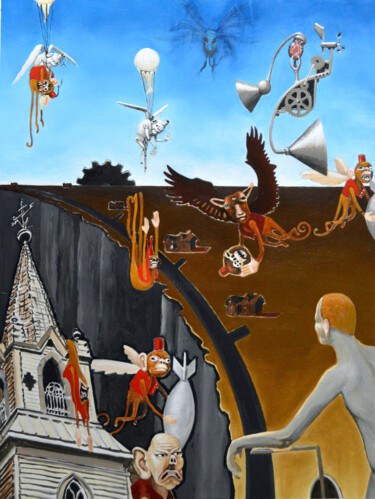
Kristopher Lionel
"Prologue (The Happy War)"
Oil on Paper | 24x18 in
Not For Sale
Prints
from $30.65
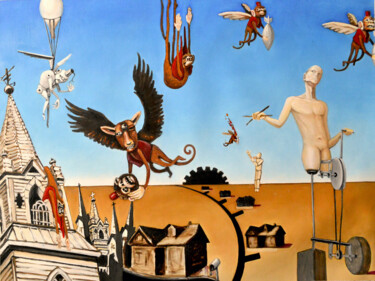
Kristopher Lionel
"Hostis Humani Generis (The Happy War)"
Oil on Paper | 16.3x23.5 in
Not For Sale
Prints
from $30.65
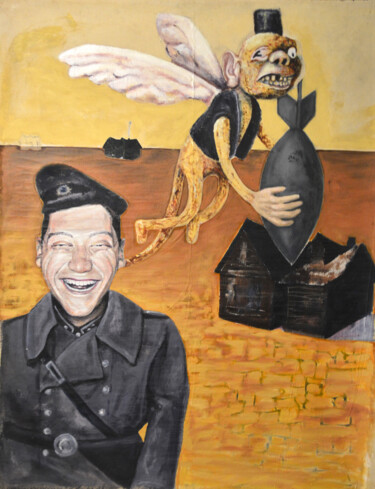
Kristopher Lionel
"Fucking Nazi (The Happy War)"
Oil on Canvas | 48x37 in
Not For Sale
Prints
from $30.65
Contact Kristopher Lionel
Send a private message to Kristopher Lionel



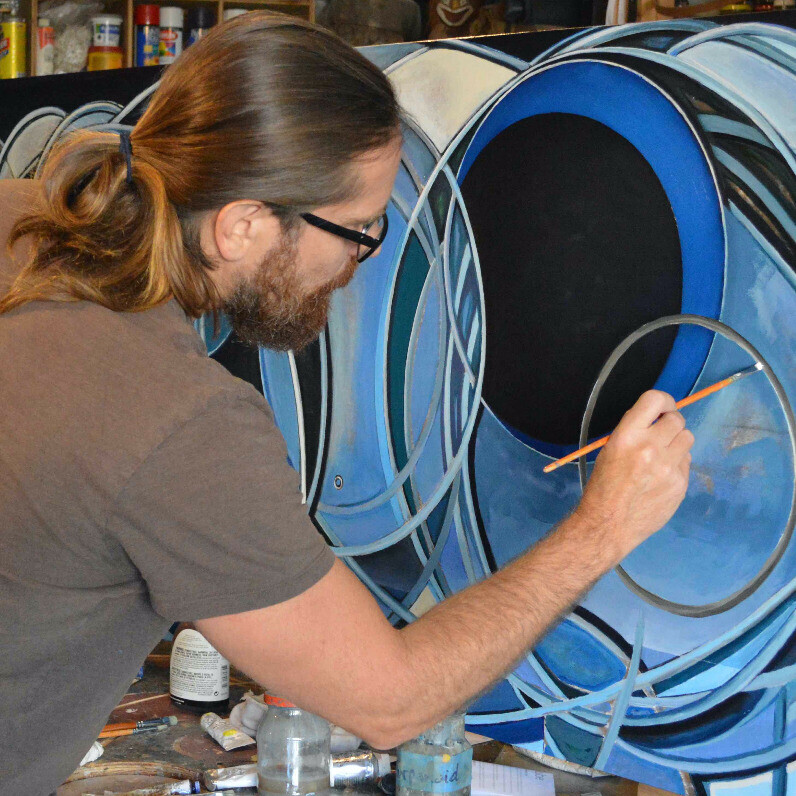
 Light Space & Time Online Art Gallery
Light Space & Time Online Art Gallery

